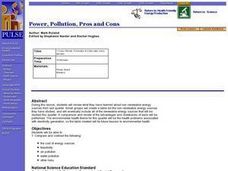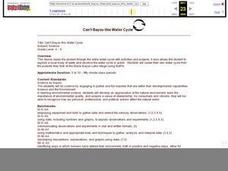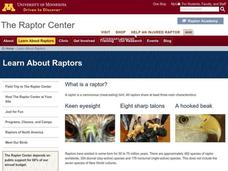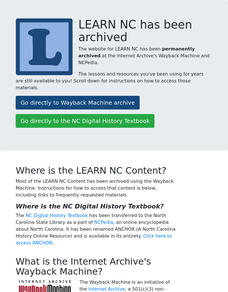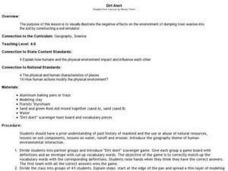Curated OER
Power, Pollution, Pros and Cons
Students review what they know about non-renewable energy, compare and contrast advantages and drawbacks of each type, such as cost of energy sources, feasibility, air pollution, water pollution, and other risks, and create table listing...
Curated OER
Outcomes Science 4: Earth & Beyond
In this earth and beyond science worksheet, students read through 11 pages of information on weather, global warming, climate change and other related topics. There are many website links on the pages that provide additional information...
Curated OER
"Home Sweet Home?"
Students research an endangered animal's habitat, investigate the survival problems. They research the animal's zoo life. They research some programs of reintroduction and chart the pros and cons of each.
Curated OER
Science: 4 X 4
Pupils generate four statements and four questions based on their current level of understanding of the article from the engage instructional activity. They
evaluate the statements and questions that they have generated and those of...
Curated OER
Habitat Is Home
Young scholars are introduced to the concept and components of a habitat. They discuss the key components of a habitat and describe how certain factors can cause disturbances in a habitat and change its population. Activities are leveled...
Curated OER
Can't Bayou this Water Cycle
Students identify the stages in the water cycle. They observe a local water source and view the cycle in action. They create their own water cycle using software.
Curated OER
Great River Bend Adventure
Students use their imagination. They discuss the 4 C's of teamwork: Concentration, Communications, Coomperation, and Consideration. Students discuss the safety guidelines of the project. They complete a rope maze. The group walks...
Curated OER
Temperature Variations and Habitability
Pupils, in groups, evaluate conditions outside the building and inside the classroom using thermometers, barometers, anemometers, etc. They compare interior and exterior conditions. They consider and discuss factors that contribute to...
Curated OER
"Approaching Walden: From Emerson to Thoreau"
Learners examine selected local leaves in greater detail in the classroom by using more analytical drawing techniques. They use Thoreau's drawing of a Scarlett Oak as their model. Students choose a leave from a box of leaves removed...
Curated OER
Fuel Cells
Young scholars examine how fuel cells and combustion engines work. Using the internet, they research the positives and negatives of the various energy sources. In groups, they complete an experiment with a working fuel cell model and...
Curated OER
The Web of Life
Young scholars describe the importance of having a balance ecosystem. After a brief lecture, students give an explanation of the properties of an ecosystem. They create a web, using yarn which shows how the various members of the...
Curated OER
River Study
Students study physical features of a local stream. They study how to identify water features on topographic maps.
Curated OER
Toxicology 2: Finding the Toxic Dose
Students brainstorm with group partners to decide upon a chemical they would like to test, and outline a procedure for their investigation. They then present in groups their ideas to the rest of the class as well as the chemical they...
Curated OER
Energy Audit
Students examine the level of energy usage on a local and national level. Using the internet, they discover ways to conserve energy every day and how over-consumption of energy negatively affects the environment. In groups, they...
Curated OER
Invasive Species
Students use the Internet to research non-native plants that exist in their local community. Using this information, they analyze the invasive species effect on their environment. In groups, they plan and execute their own project to...
Curated OER
the New Explorers:Into the Depths
Students explore the self preservation mechanism that is inherent in the Great Lakes. They examine how scientists are studying Great Lakes, and what their predictions are for these national treasures.
Curated OER
Let's Catch Some Dirt From the Air
Students create "catchers" that collect dirt particles from the air. They observe the particulate matter that is collected from the air and discuss the effects and causes of air pollution.
Curated OER
Economics, Ecology, & Ethics
Students are introduced to the concepts of economics in a ethical way. In groups, they examine a shift in an economy and discover the effects of the shift. After reading an article, they evaluate it and they write their own conclusion...
Curated OER
Animal Habitats and Their Management
Learners review components present for a quality animal habitat and then explore a goose pond to find out what animals reside there. They learn how wildlife managers work with the land so everything can co-exist together.
Curated OER
Biological Sampling Device Using a Sea Perch
Pupils construct plankton nets to be towed and collect specimens to be examined and analyzed in the classroom. They develop research skills through collection of an aquatic sample. They write lab reports after interpreting, identifying...
Curated OER
The Moon
Third graders identify the phases of the moon. They use the internet to see the different phases of the moon on different dates. They form their own opinions from the information they have read and justify their opinions to their...
Curated OER
Dirt Alert
Students explore the environment and effects of pollution. They participate in a "Dirt Alert" scavenger game to study vocabulary words. Students construct a soil simulator to visually illustrate the negative effects on the environment of...
Curated OER
Introduction to a Unit on the 1930's Depression in America
Learners view and discuss photographic images of the Dust Bowl by Dorothea Lange. They discuss who Dorothea Lange was and why she took the pictures, the conservational factors that contributed to the Dust Bowl and migrant workers and the...
Curated OER
The Arctic and Taiga Ecozone of Canada
Students examine the various sub-regions of the Arctic and Taiga zones in Canada. Using the online Canadian Atlas, they locate and describe the characteristics of each zone. They organize their information into a chart and share it with...


